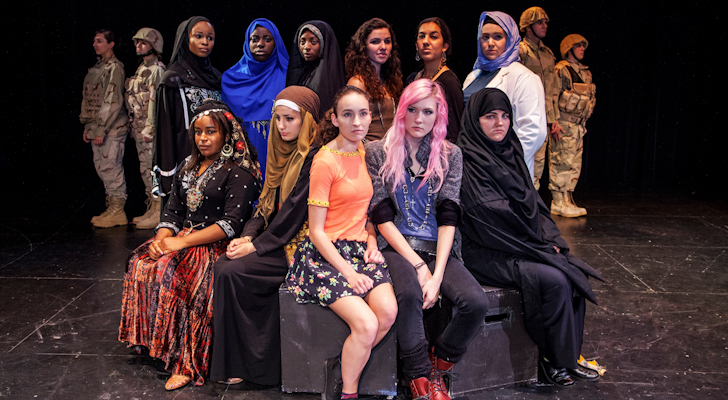
The cast of "9 Parts of Desire," opening Nov. 12 and running through Nov. 22 in Theatre 2. Photo by Candace Kaw
By Barbara Melendez
USF News
TAMPA, Fla. (Nov. 12, 2015) – When the award-winning play “9 Parts of Desire” opens at USF’s Theatre 2 tonight, it will be the first time it will have 16 actors playing the part of what has typically been a one-woman show. This innovative production, directed by Andrea Assaf, includes women and men – not all theatre students – and only one Middle Eastern student in a play about nine Middle Eastern women.
“It is so touching that they want to invest in a world and tell a story about this world,” said playwright and actress Heather Raffo, who worked with the cast last month. "There is a whole other conversation that can be had when 19 and 20-year-olds bring you this story because they care to.”
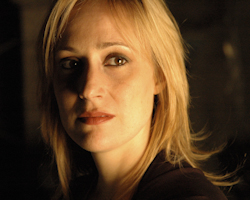
Playwright and actress Heather Raffo.
Conversation has been an integral part of every production of “9 Parts of Desire” since its very first performance. Audience members waited for Raffo in the lobby and wanted to talk about the play. She then started having talk-backs from the stage with audiences – each unique to their locations in such diverse places as Great Britain, Scotland and parts of the U.S. Audiences talk about what’s going on in their corners of the world.
“I’ll never forget how the audience erupted when a man in Malta declared, ‘We’re really racist here. This play humanizes Middle Eastern people,’ which he said troubled him,” Raffo recalled. She discovered that even though many street names in Malta have Arabic names, people from Africa, whether northern or southern, are discriminated against. “The play brought on a very spirited conversation.”
One might expect there to be deep partisan and political views hindering interest in a play about the Middle East, let alone discussions. Instead Raffo continues to find a hunger for knowledge and understanding after every performance.
“Surprisingly, many American audiences have included people from the military and many different walks of life,” she said. “They were not afraid of getting into the conversation. There weren’t a lot of people talking about similar things in other arenas. This play filled a void.”
Raffo is excited about seeing what audiences in Tampa Bay produce in the way of conversation.
“Tampa is a very diverse community, with a large military presence,” Raffo noted with her excitement about presenting the play to students. “This generation is removed from the issues that caused these conflicts. But it’s in their hands now, how they read history and what they remember. I’m curious to see how they take it in and what they do with it.”
A Departure From Lady Macbeth
As the child of an Iraqi father and an American mother, Raffo perhaps couldn’t ask for a more challenging experience of the world and couldn’t help but feel the absence of half her family’s worldview – in life and as an actress.
She has played Lady Macbeth and has been in the cast of other Shakespearean plays as well as such plays as “Over the River and Through the Woods” and “The French Lieutenant’s Woman,” to name a few. Acting parts are essentially nonexistent for Iraqi women. Parts for Middle Eastern women in general were largely stereotypical at best.
Life stepped in to motivate her. The first Gulf War happened. Then 9/11 happened. Then the Iraq War happened. All the while Raffo the playwright was emerging in fits and starts.
While in college, it was the play “For Colored Girls Who Have Considered Suicide When the Rainbow is Enuf,” by Ntozake Shange that planted the seed for the playwright Raffo was to become. “I just loved what she did and how she did it. She decided in that moment, “If I create on my own, I’ll be as true to my voice as she was to hers.”
With her fellow Americans she watched news events unfold before her eyes and images of bombs dropping on Middle Eastern cities. Only she had people she loved at the forefront of her mind, members from her father’s large extended family of uncles, aunts and cousins. She was searching for places and faces that would become familiar to her as she grew up, visited and got to know them over the years.
“With 13 years of sanctions and watching my middle class family members of doctors and professionals fall into poverty, I spent years rethinking, rewriting, regrouping,” she said. “Every person, every experience, everything I saw needed to be articulated in some way. There weren’t a lot of people talking about similar things in other arenas, Iraq’s history, the Iraqi people’s concerns, the deep secrets in their hearts.”
When she wanted to have serious conversations and commiserate with them on rare visits with her family, Raffo was instead surprised by “the love of life and the zest for life” that she has found among her relatives living through the turmoil of war.
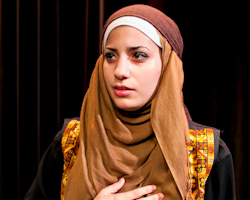
Malak Fakhoury in the role of Umm Ghada.
Photo by Candace Kaw
All the while, “9 Parts of Desire” was being written, between 1998 and its first performance in 2003, it was coalescing into “less a piece of activism than an artistic conversation,” she said. “I felt strongly that the arts should be addressing things that are relevant to the times we’re dealing with.”
As world events were quickly changing, she found herself layering each new crisis on what she was writing. Then with every performance she learned more and has been doing a lot of fine-tuning since. Even now, Raffo updates the show to reflect current conditions.
At first, theater owners were not exactly fighting with each other to mount productions of her play once it was done.
“The fortunate part was that Americans were at a precipice of wanting knowledge – though theaters not so much,” Raffo said. “They weren’t sure about what the public could or would take in. Interestingly enough, the current affairs press ran with it. The public affairs press couldn’t get enough of it.”
And "9 Parts of Desire" became a hit.
The circuit of theaters is impressive – the Traverse Theatre, Edinburgh, Off-West End London’s Bush Theatre, Off Broadway’s Manhattan Ensemble Theatre; praise from the toughest theatre critics from The New York Times, the Wall Street Journal, Time Out and the Village Voice – all impressive as well.
Her one-woman play went on to receive many awards including a highly sought-after Lucille Lortel Award, and the prestigious Susan Smith Blackburn and Marian Seldes and Garson Kanin playwriting award, as well as Helen Hayes, Outer Critics Circle and Drama League nominations, for outstanding performance. A concert version of the play ran at The Kennedy Center with renowned Iraqi maqam musician Amir El Saffar.
At the Forefront of a Genre
In the years since Raffo wrote her play, parts for her have come up in plays set in the Middle East, namely “Food and Fadwa,” and “SEVEN – a documentary play.” She has seen the growth of a genre of Middle Eastern theater and it is “being studied throughout American Universities and international ones, plays by and about people from the MENA region, that is, the Middle East and North Africa.” She pointed to three theaters dedicated solely to this kind of work: Noor Theatre in New York City, Golden Thread in San Francisco and Silk Road Rising in Chicago.
Raffo can take pride in place at the forefront of a new movement.
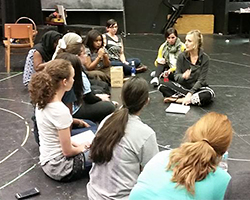
Playwright Heather Raffo shares notes with cast during a rehearsal of "9 Parts of Desire." Photo by Andrea Assaf
“What ‘9 Parts’ did for the first time was to put the Middle Eastern voice on the main stages in theaters across America,” she said. “It transcended the female or ethnic slot that most of our nation’s big theaters save for their smaller theater or black box. Because it was a commercial success and a hit, it paved the way for more to come.”
Raffo has also taught and performed at dozens of universities and arts centers both in the United States and internationally engaging students about the politics and arts of Iraq and about her own experience as an Iraqi-American playwright and actress.
Noted American producer, director and playwright David Fishelson told her, “This is the play I’ve been waiting for,” and used it to conclude his tenure with the Manhattan Ensemble Theatre. John Lahr said in The New Yorker that her play was “…an example of how art can remake the world.” With observations like these, Raffo looks back on her first feelings of dissatisfaction with gratitude.
“If I hadn’t been dissatisfied..., being dissatisfied is not a bad thing, it’s in moments of desperation that we see how strong our voice is,” she said. “The play has definitely opened a window to the kind of work I knew I was going to love exploring.”
“9 Parts of Desire” comes to USF in partnership with Art2Action, Inc., through the Association of Performing Arts Presenters' “Building Bridges: Campus Community Engagement Grant Program,” a component of the Doris Duke Charitable Foundation and the Doris Duke Foundation for Islamic Art, known as “THIS Bridge: Arab, Middle Eastern & Muslim Artists.”
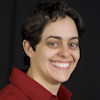
Director Andrea Assaf
Photo by Barbara Campbell
The play runs Nov. 12-14, 19-21 at 7:30 p.m.; Nov. 15 and 22 at 3 p.m. in Theatre 2. For tickets, click here, visit boxoffice.arts.usf.edu or call (813) 974-2323. Tickets are $10 for students, seniors and active military; $15 for general admission.
Barbara Melendez can be reached at 813-974-4563